The NationSwell Fellows program is dedicated to transforming the future by empowering youth leaders to thrive as changemakers. Started in 2022, the Fellows program harnesses NationSwell’s robust ecosystem to help the next generation of young leaders get closer to their personal and professional aspirations while simultaneously building equitable pipelines into the social impact field.
This past year, NationSwell was thrilled to host the second cohort of its Fellows program, sponsored by Cerberus, Service Now, and American Family Insurance Institute for Corporate and Social Impact. Each year, the program empowers young impact leaders to build and sharpen their skills, grow their network, and develop a project that meaningfully contributes to their social or environmental focus area.
To cap an incredible eight months of work, this year’s group of innovators gathered at Steelcase’s Manhattan offices on June 14th to present the projects they have been incubating through the program. A few fellows also pitched their incubator projects for further development in our pilot accelerator program, which kicks off this summer. Pitched projects were judged by a panel of four NationSwell Community members: Aaron Miller, Kim Koeman, Titilayao Golden, and Darriel Sanders. Fellows were judged on impact, relevance, feasibility, viability, innovation, and scalability.
Thanks to support from Jon & Wendy Stahl, fellows accepted into the three spots in the accelerator program will receive dedicated 1:1 support for their projects, as well as access to NationSwell’s unique ecosystem of impact leaders to build their social capital.
Below is a brief recap of the projects that were showcased:
The Asian Americans with Disabilities Initiative (by Jennifer Lee)
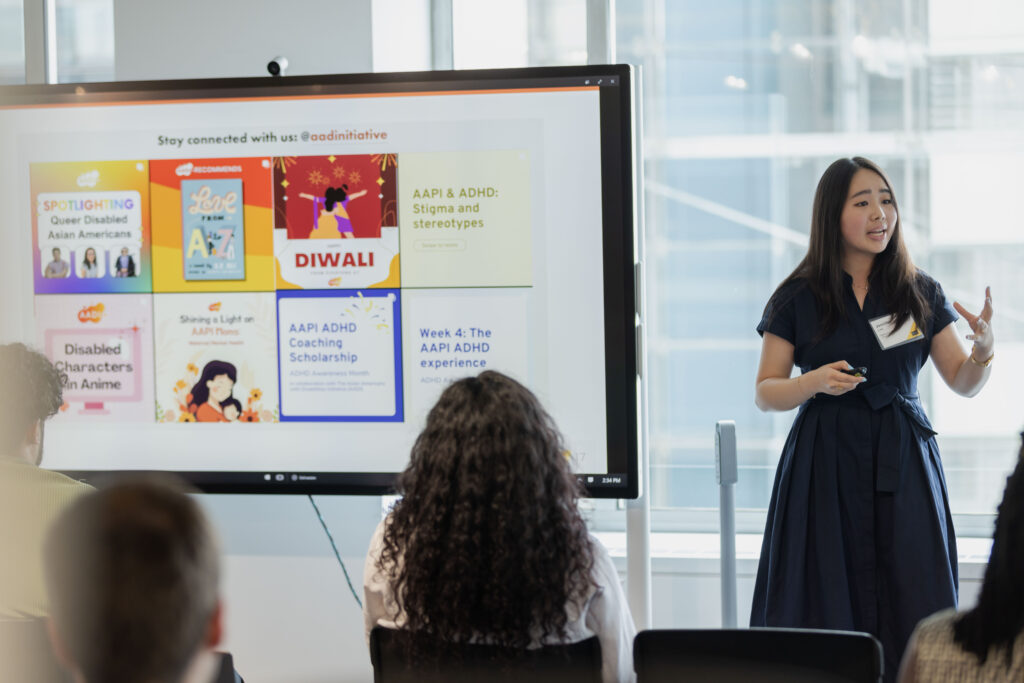
Concept: The Asian Americans with Disabilities Initiative was designed to provide the next generation of disabled Asian American leaders with accessible resources so that they can combat anti-Asian racism and ableism in their own communities. AADI relies on three core pillars to meet its goal of linking disabled people of color to the professional and cultural support necessary to navigate their dual marginalized identities: research, advocacy, and communities.
- Goals:
- Forge community partnerships in order to evaluate strengths and weaknesses and increase operational efficiency
- Focus on grassroots expansion in order to increase widespread understanding of disability in global communities
- Distribute disability-oriented medical technologies to those in need
- Capitalize on expertise in intersectional identities in order to support technologies that improve transportation accessibility and provide new tools for advocating on behalf of disabled individuals.
Bridging the Gap to Inclusive and Ethical Practices in AI for Hiring (by Nitya Raviprakash)
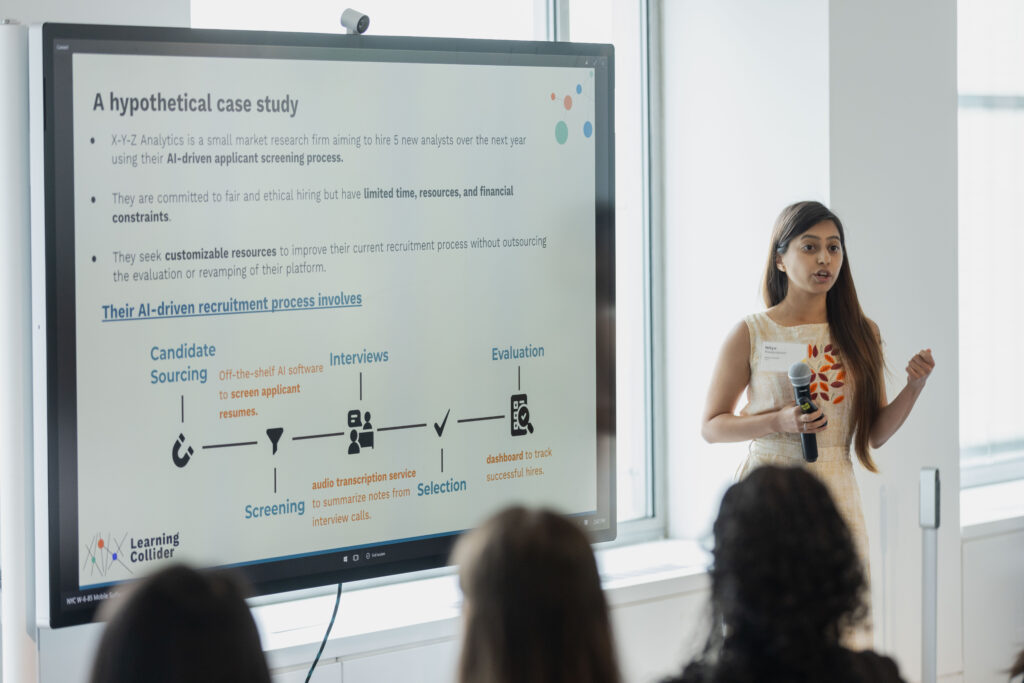
Concept: The widespread adoption of AI technology in hiring processes — which includes candidate sourcing, resume screening, assessment, and engagement — poses a significant risk of bias and discrimination. New, customizable assessment tools can help to identify the barriers hindering organizations from adopting fair and equitable practices in AI-driven hiring, isolate challenges, and forge new opportunities to increase equity.
- Goals
- Interview organizations to help determine needs and shape resources
- Focus on challenges unique to organizations with limited resources (e.g. small nonprofits)
- Curate vetted resources and tools
- Create automated assessment tool to guide organizations
Mental Health Mailboxes: A Community Approach to Mental Wellness (by Alexandria Ang)
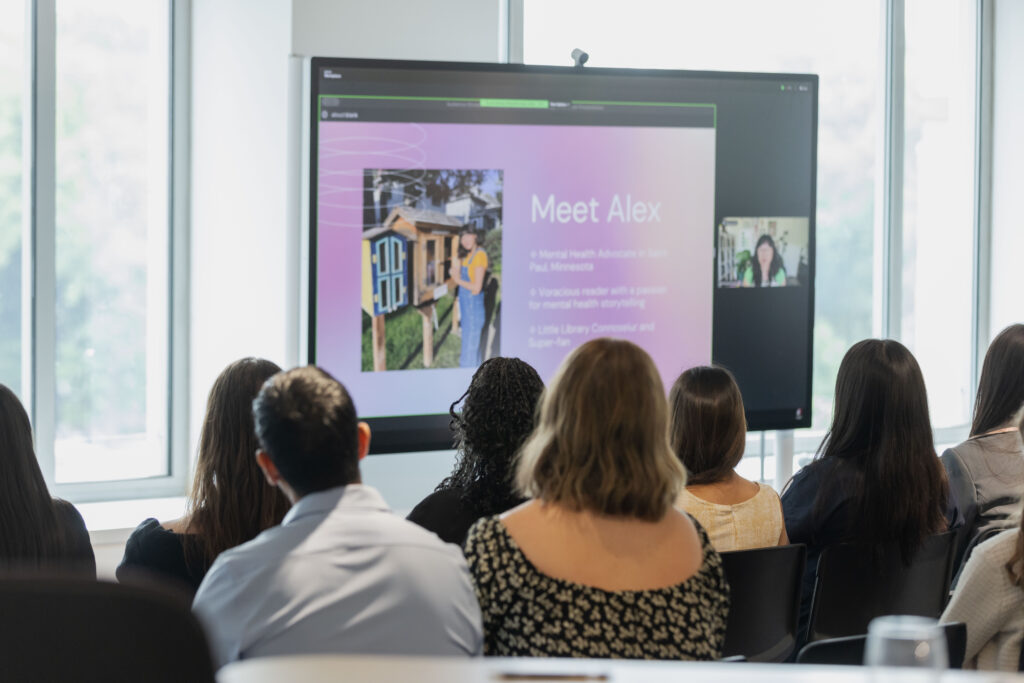
Concept: Mental Health Mailboxes aims to improve access to mental health resources through the deployment of mailboxes. Inspired by “little free libraries,” these mailboxes will initially be stocked with mental health resources like pamphlets, stress balls, and affirmation cards, with the ultimate goal of having communities contribute additional resources as they see fit. Through co-location, this intervention is able to address the unique needs of varying communities while addressing barriers to access.
- Goals:
- Draw on the power of collective aid with the goal of incorporating storytelling into mental health awareness
- Reduce stigma around mental health
- Increase accessibility in communities and foster local connection and awareness
Decolonization of Education and Entrepreneurship (by Ericka Kamanou-Tenta)

Concept: A Pan-African movement and awareness campaign that will tackle the detrimental effects of neocolonialism in educational structures that impacts underserved African communities. Through a dedicated curriculum, digital platform, and storytelling, this program partners with social institutions embedded in communities to help build entrepreneurial ecosystems in Africa.
- Goals:
- Foster a stronger sense of identity among young adults in Africa
- Increase awareness around the importance of access to the education and resources that will enable young Africans to start successful business ventures
Stories of Consent (by Maya Siegel and Emily Bach)
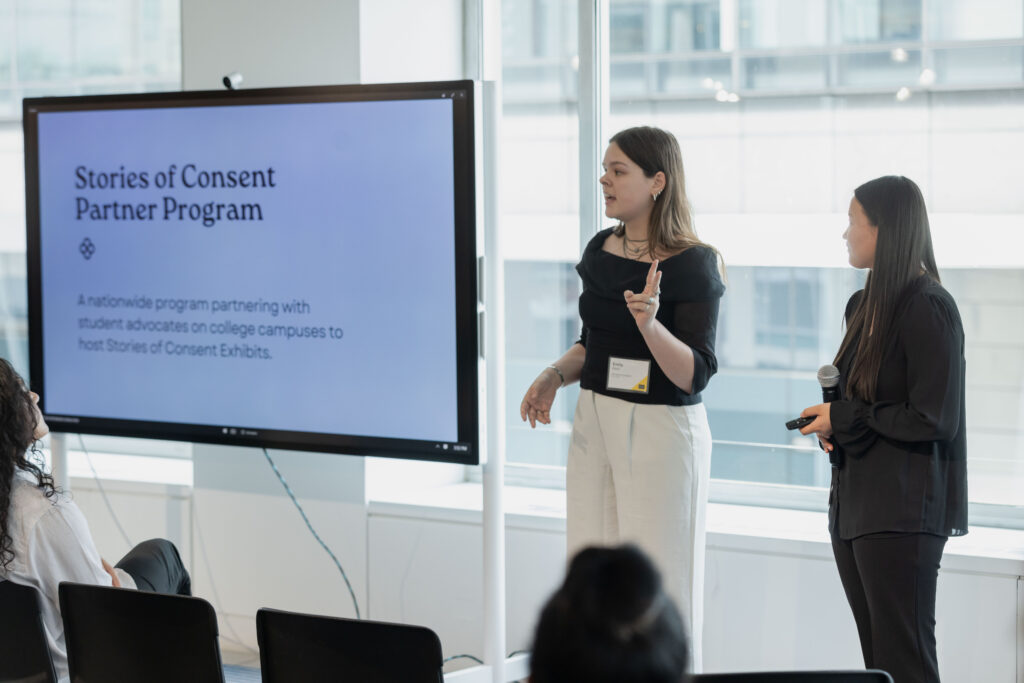
Concept: In the United States, only 12 states currently teach comprehensive consent education, and the vast majority of young adults enter college without learning about consent. Stories of Consent uses a community-based model to make consent education more accessible, actionable, and relatable to young people. The initiative is continuing to expand into college campuses, aiming to address legislative hurdles facing many states in the South. With the ultimate goal of hosting in-person education events across every red state in America, they are continuing to amplify stories of affirmative consent from all 50 states online while also providing Certified Peer Educator Training for middle and high schools students across the country.
- Goals:
- Bridge the knowledge gap by offering accessible, actionable, and relatable consent education in schools across America.
- Expand in-person events in red states over the next 1-3 years by partnering with student advocates on college campuses to host Stories of Consent exhibits
Building TRUST (Translational Research for Understanding, Solidarity, and Transformative Impact) — Guiying (Angel) Zhong
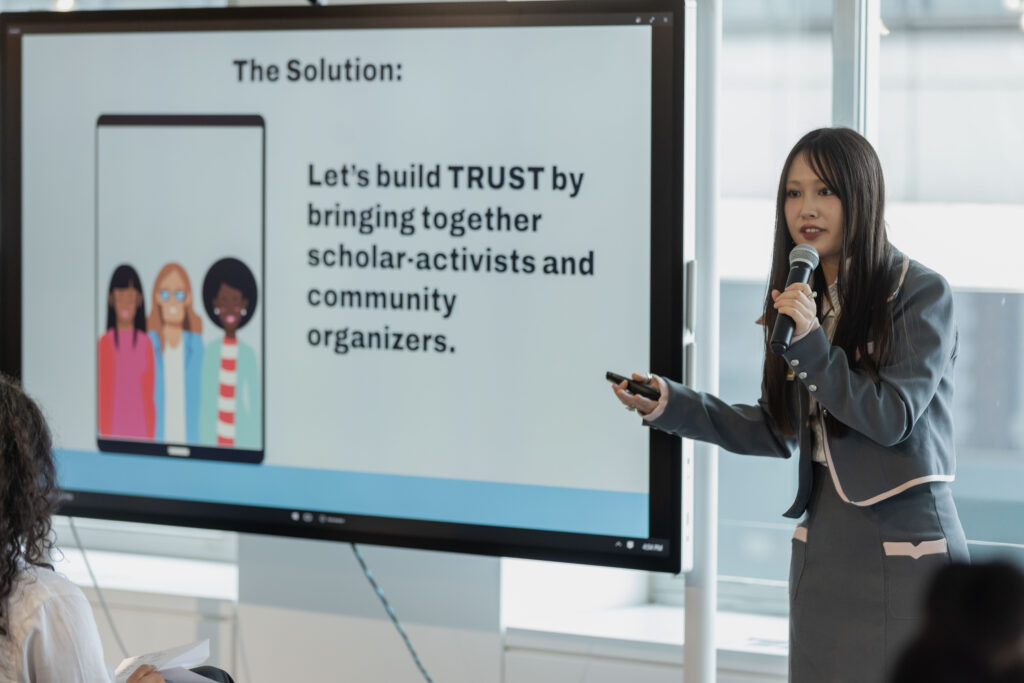
Concept: TRUST is a mutual aid network that brings community organizers and scholar-activists together around the world to unite on the way that research is conducted and disseminated and ultimately reduce scientific bias. With a focus on intergenerational trauma, this initiative looks to better support AAPI communities by finding models to integrate scholar-activism into established research institutions.
- Goals:
- Utilize community-based and critical participatory methods to address racialized and gendered disparities in the research community
- Reduce barriers to entry for underserved and underrepresented communities, with a particular focus on Asian American and Pacific Islander (AAPI) women and fems
Bridging the Gap — Jorge Alvarez
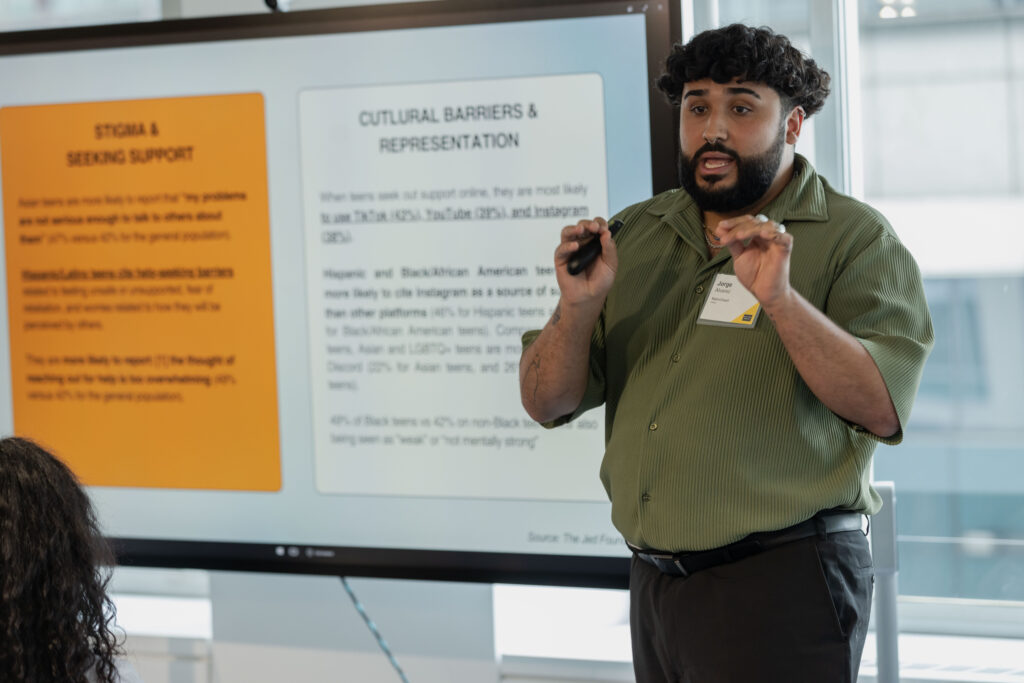
Concept: There are a multitude of unique barriers facing BIPOC communities in gaining access to mental health resources, including stigma around seeking support, cultural barriers and representation, and deep generational divides. This campaign aims to create an intergenerational model for youth mental health crisis interventions through representation by showcasing clinically-backed strategies that foster a supportive environment between guardians and their children.
- Goals:
- Create a video guide for parents that models healthy, intersectional, authentic, and vulnerable dialogue on mental health.
- Learn more about and help to shine a light on what mental health looked like for parents’ generations — including when they felt helped and validated and when they felt abandoned — with an emphasis on the BIPOC experience.
- Create an awareness campaign for parents and guardians to learn more about how they can help their children through mental health challenges in a compassionate way that honors their own experiences.
We at NationSwell are so proud of the intersectional, community-focused projects this year’s cohort of Fellows pioneered, and are excited to already be planning programming that will support a third cohort of young changemakers eager to make their mark on the world. If you’d like to learn more about how you can sponsor the incredible work that our Fellows do, feel free to reach out to Minna Son ([email protected]) and Maddy Allison ([email protected]).

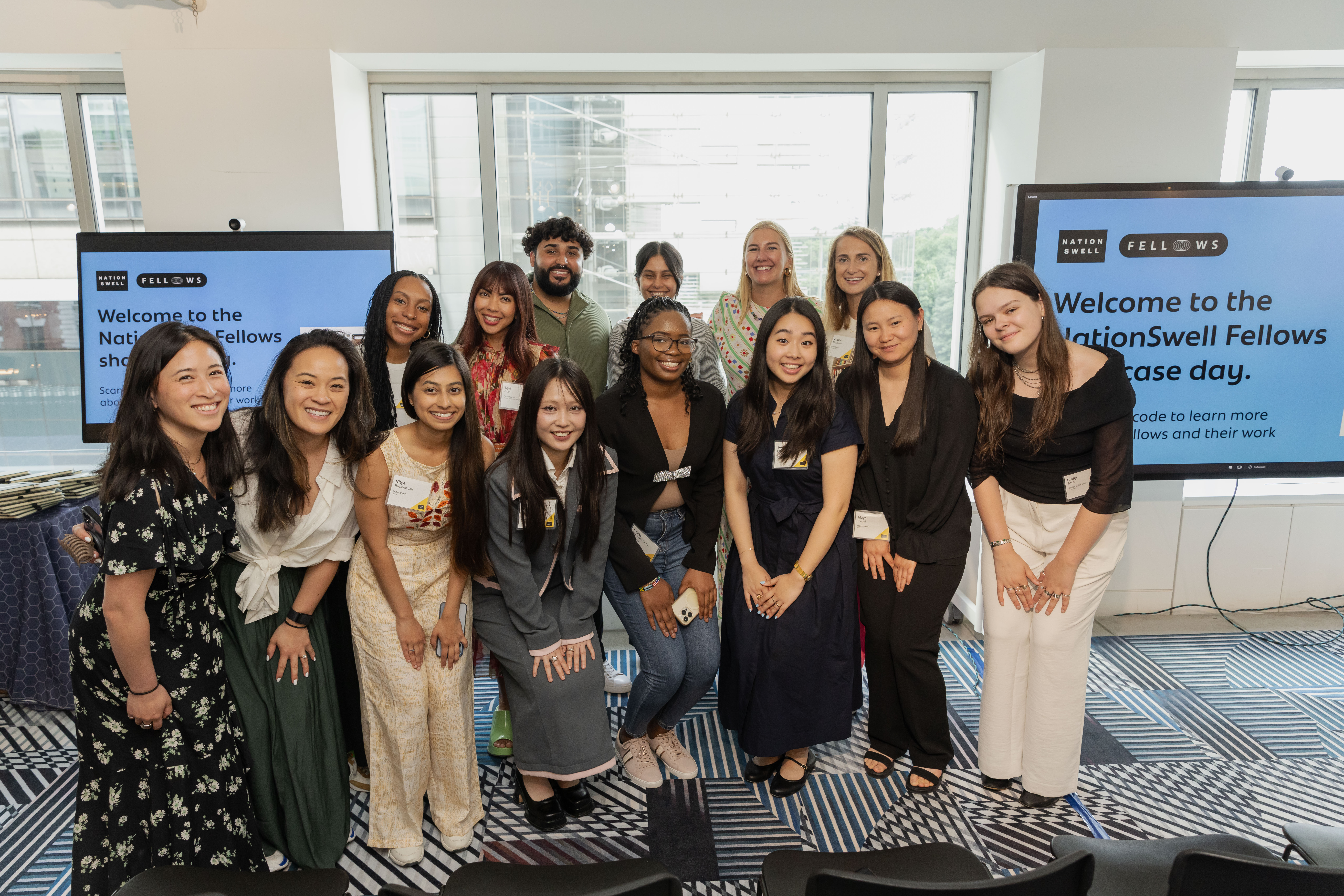 "
"